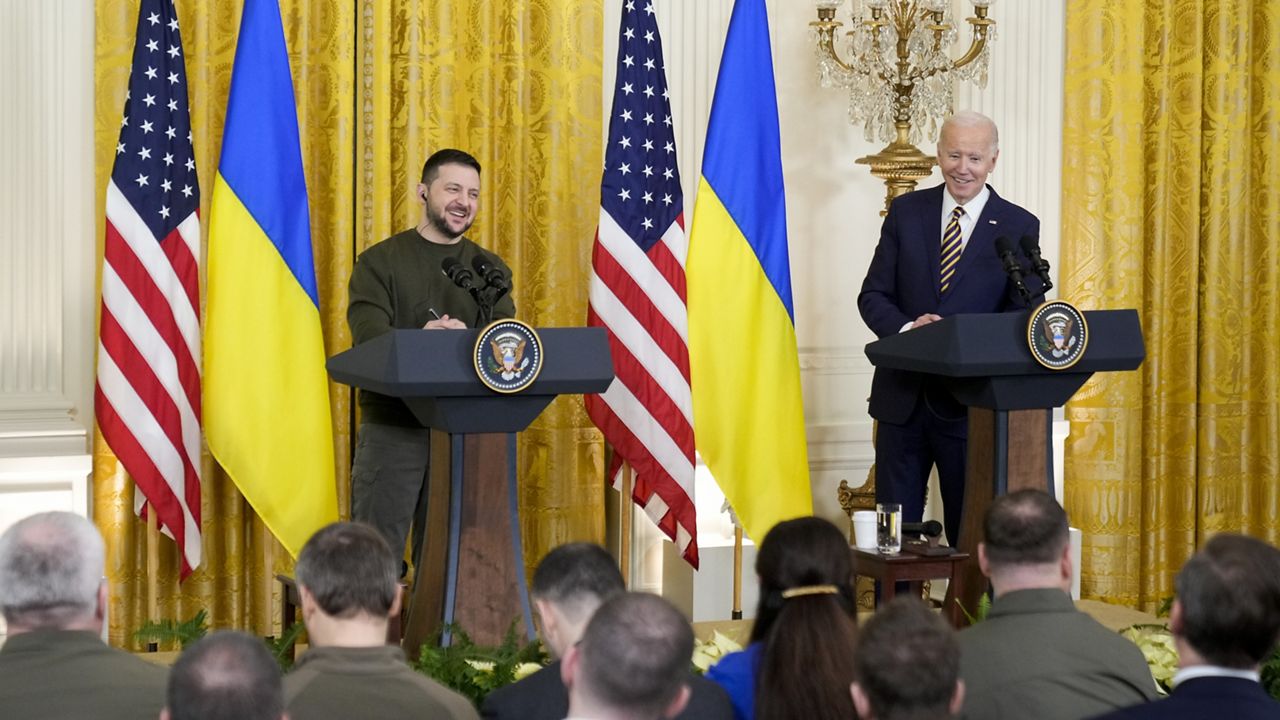U.S. support for Ukraine remains “unwaveringly strong” despite news that the stop-gap budget Congress passed to avert a federal government shutdown will not include new financial support for Kyiv, a Ukrainian official said Sunday.
Oleg Nikolenko, a spokesperson for Ukraine’s Foreign Affairs Ministry, said a shutdown could have impacted ongoing aid programs but that the temporary budget would not affect the billions of dollars of financial assistance already pledged by lawmakers in Washington.
“Support for Ukraine remains unwaveringly strong both in the U.S. administration, in both parties, in the houses of the U.S. Congress and most importantly, among the American people,” Nikolenko wrote on social media.
The omission of additional Ukrainian aid from the shortr-term funding bill, which aims to keep the federal government running until Nov. 17, has raised concerns for a country that relies heavily on Western support in its fight against Russia’s ongoing invasion.
A little more than a week ago, lawmakers met in the Capitol with Ukrainian President Volodymyr Zelenskyy, who sought to assure them his military was winning the war but stressed that additional aid would be crucial for continuing the fight.
Yet recent voting in the House has pointed to increased U.S. isolationism and a growing resistance to providing further aid as the war, now in its 20th month, grinds on.
In a sign of a partisan divide on the issue,nearly half of House Republicans voted to strip $300 million from a defense spending bill to train Ukrainian soldiers and purchase weapons. The money later was approved separately, but opponents of Ukraine support celebrated their growing numbers.
Writing on Telegram, Ukrainian parliament member Oleksiy Goncharenko said Sunday that Kyiv needed to adopt new measures to receive the continued support of both American officials and the general public. Without it, Goncharenko said, Ukrainians have “practically no chance” of defending themselves.
He set forward a list of proposals that included permanently posting Ukrainian delegates in Washington.
“We need to speak the language of money with the U.S.: How will the United States benefit from Ukraine’s victory? What will the U.S. get? What will American taxpayers get?” Goncharenko wrote. “We need to change strategy. We need to act differently. Let’s fix this situation. We cannot lose.”
Elsewhere, Britain’s new defense secretary stressed his support of Ukraine, suggesting that British military training of Ukrainian soldiers, which currently takes place at U.K. bases, could move into western Ukraine.
In an interview with the Sunday Telegraph, Grant Shapps said he was in discussions with the British army about “eventually getting the training brought closer and actually into Ukraine as well.”
Prime Minister Rishi Sunak was quick to rule out speculation of an imminent deployment of British soldiers to Ukraine. Shapps' suggestion was not for the “here and now,” Sunak told reporters, but a possibility “for the long term.”
“There are no British soldiers that will be sent to fight in the current conflict. That’s not what’s happening,” Sunak said.
Russian politicians immediately criticized the proposal. Former President Dmitry Medvedev, who is deputy secretary of Russia's Security Council, claimed Shapps was actively pushing "towards a Third World War.”
The British minister “will be turning his instructors into a legal target for our armed forces, knowing perfectly well that they’ll be mercilessly destroyed — not as mercenaries, but as NATO specialists,” Medvedev wrote on social media.
Since Russian President Vladimir Putin sent troops into Ukraine more than 19 months ago, Medvedev, a law school graduate, has emerged as one of the most hawkish Russian officials, regularly issuing blustery remarks that combine Latin mottos and legal expressions with four-letter words.
Observers have interpreted Medvedev’s rhetoric, which sounds tougher than the statements of even old-time Kremlin hardliners, as an apparent attempt to curry favor with Putin.
Yan Gagin, advisor to the head of the Russian-occupied part of eastern Ukraine’s Donetsk region, also dismissed Shapps' idea but without Medvedev's fiery warnings. "Even if British instructors do organize training for Ukraine’s armed forces inside Ukraine, it won’t bring any results," Gagin told Russian state news agency RIA Novosti.
“Ukraine’s failed counter-offensive has already shown the level of such training,” he added.
More than 23,500 recruits from Ukraine have received combat training at army bases across the U.K. since the start of 2022, receiving instruction on skills that include weapons handling and battlefield first aid. Earlier this year, Britain's government committed to training another 20,000 recruits.
The training is part of a broader package of support for Ukraine that includes a pledge of $2.8 billion of anti-tank weapons, rocket systems and other hardware this year.
Shapps, who took over as defense secretary from predecessor Ben Wallace in August, said he also spoke with Ukrainian President Volodymyr Zelenskyy in recent days about Britain’s Royal Navy helping to defend commercial vessels in the Black Sea. He did not provide details.
He added that U.K. defense companies should consider setting up production in Ukraine.
“Particularly in the west of the country, I think the opportunity now is to bring more things in country, and not just training. We’re seeing BAE, for example, move into manufacturing in country,” he said, referring to the leading British defense and aerospace manufacturer. “I’m keen to see other British companies do their bit as well by doing the same thing.”



